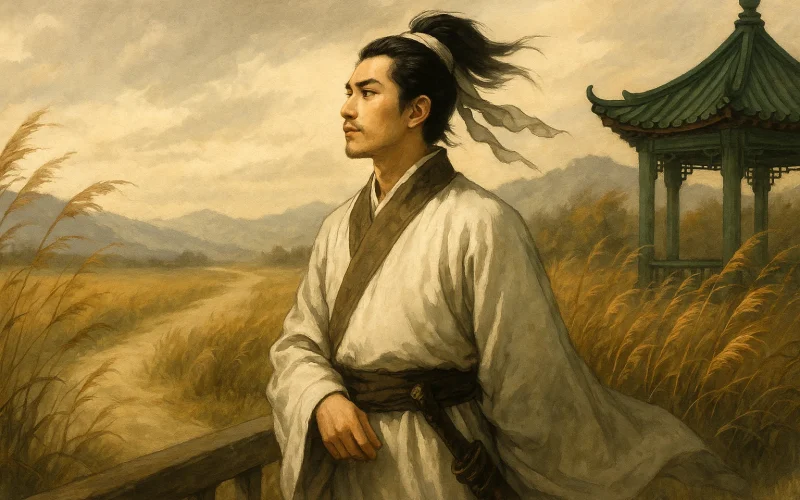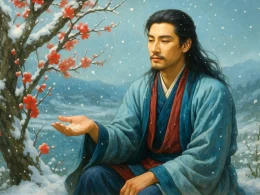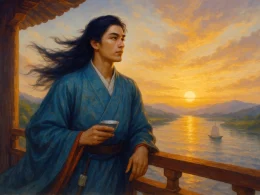Song Zhiwen (宋之问, 656–712 CE), a native of Fenyang, Shanxi (some records suggest Lingbao, Henan). Song Zhiwen attained the jinshi degree in 675 CE. During Empress Wu Zetian's reign, his literary talent secured him a position as a court attendant, where he enjoyed exceptional favor. Later, Song Zhiwen was implicated through his association with Zhang Yizhi and demoted to Military Adviser (canjun) of Shuangzhou. In 708 CE, he was reassigned as Vice Director (yuanwailang) of the Bureau of Evaluations (kaogong) and appointed an Academician of the Institute for the Advancement of Literature alongside Du Shenyan and Xue Ji, only to be demoted again to Vice Prefect (changshi) of Yuezhou for accepting bribes. In 710 CE, Song Zhiwen was exiled to Qinzhou, and Emperor Xuanzong ordered his execution in 712 CE.
Major Works
Life and Career
Born into a scholar-official family, Song Zhiwen demonstrated exceptional intelligence and literary aptitude from childhood. After earning his jinshi degree in 675 CE during Emperor Gaozong's reign, he swiftly rose to prominence through his poetic talent. Under Wu Zetian, he was summoned to court as an academician of the Hongwen Institute and later as a Hanlin attendant, becoming a key literary figure in the imperial circle. However, after the Shenlong Coup (705 CE), his close ties with the Zhang Yizhi faction led to his demotion to Military Adviser of Shuangzhou, marking the beginning of his turbulent political career.
During the Jinglong era (708 CE), he was reappointed as Vice Director of the Bureau of Evaluations and concurrently served as an Institute Academician, only to be demoted again to Vice Prefect of Yuezhou for corruption. In 710 CE, he was exiled to Qinzhou for alleged involvement with Crown Prince Li Xian's faction. When Emperor Xuanzong ascended the throne, Song was ordered to commit suicide in 712 CE, ending his controversial yet remarkable life in his fifties.
Literary Achievements
Song Zhiwen was a quintessential court poet during the transition from the early to high Tang period. Alongside Shen Quanqi, with whom he was often paired as "Shen-Song," he played a foundational role in standardizing regulated verse (lüshi). Their systematic exploration of tonal patterns, parallelism, and rhyme schemes in five- and seven-character regulated verse established formal conventions that significantly advanced the maturation of Tang poetry.
As a long-serving court poet, his works encompassed ceremonial, palatial, frontier, and landscape themes, showcasing masterful linguistic control and formal precision. While many of his occasional poems prioritized ornate diction over personal expression, his exile-period compositions—such as Crossing the Han River and Inscribed at North Station of Dayu Ridge—revealed genuine emotion and introspective depth, marking a breakthrough in his poetic voice.
Poetic Style
Song's style evolved across two phases: his early works epitomized the courtly tradition with their ornate craftsmanship and strict adherence to rules, while his later exile poetry adopted a more somber, emotionally resonant tone.
He excelled in depicting courtly and bureaucratic life through refined diction and meticulous structure. His masterpiece Crossing the Han River exemplifies his late-period sincerity and depth:
Crossing the Han River
Beyond the mountains, letters cease;
Winters and springs pass unseen.
Nearing home, my heart trembles—
I dare not ask travelers for news.
This poem transcends conventional courtly aesthetics with its plainspoken vulnerability, offering an authentic reflection of his exiled psyche and standing as a poignant testament to his artistry.
Anecdotes and Legacy
Song's tumultuous career and complex personality spawned numerous anecdotes, ranging from admiration for his genius to infamy for his alleged envy-driven ruthlessness.
The most notorious tale involves his murder of nephew Liu Xiyin. Legend holds that Liu composed Lament of the White-Haired Man, whose lines "Flowers bloom alike year after year; / Year after year, faces disappear" were so striking that Song demanded ownership. When Liu delayed handing over the poem (possibly for revisions or reluctance), Song allegedly ordered servants to suffocate him with sandbags. Though this account appears only in unofficial sources like Ben Shi Shi, it profoundly damaged his reputation, casting him as the archetypal "poet-killer."
Another rumor claims he once drowned rival poet Shen Quanqi after losing a court poetry competition—further cementing his image as a vindictive schemer.
While these stories may be apocryphal, they reflect the cutthroat literary politics of the era, where talent was both a path to glory and a weapon in power struggles. Song's duality—a pioneering poet who refined verse forms yet stooped to brutality for fame—mirrors the contradictions in his work: dazzlingly polished yet shadowed by melancholy. His life and art remain inseparable, embodying the tensions between ambition and artistry in Tang literary culture.














